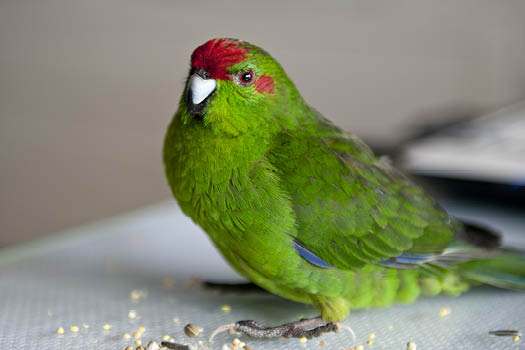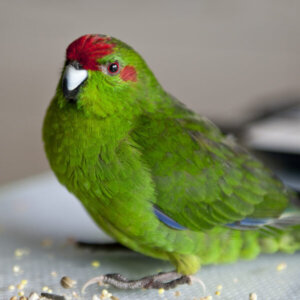Can Kakarikis Eat Grapes? A Complete Guide for Parrot Owners
Yes, Kakarikis can eat grapes. Grapes are safe and nutritious for them.
Kakarikis, with their vibrant personalities, love a varied diet. Fresh fruits often make their meals more enjoyable. Grapes are a favorite among many bird species, including Kakarikis. They provide essential vitamins and minerals. But it’s important to know how much and how often to feed them.
In this post, we will explore the benefits and potential risks of feeding grapes to Kakarikis. We’ll also provide tips on how to serve grapes to your feathered friends. This will help ensure they stay healthy and happy. So, if you are curious about adding grapes to your Kakariki’s diet, read on!

Credit: www.northernparrots.com
Introduction To Kakarikis
Kakarikis can enjoy grapes as a tasty treat. These small, sweet fruits provide essential vitamins and hydration. Always offer grapes in moderation to keep your Kakariki healthy.
Kakarikis are small, colorful parrots native to New Zealand. They are known for their playful nature and vibrant colors. These birds make excellent pets due to their friendly demeanor and intelligence.Origins And Characteristics
Kakarikis originate from New Zealand. They live in forests and coastal areas. They have bright green feathers with red markings on the head. Their bodies are small and agile, perfect for flying and climbing. Kakarikis are curious and active, always exploring their surroundings.Popular Pet Parrots
Kakarikis are popular pets for many reasons. They are social and love human interaction. They can mimic sounds and even learn simple tricks. Their playful behavior makes them entertaining companions. They also adapt well to living in homes, enjoying a variety of toys and activities. “`Nutritional Needs Of Kakarikis
Kakarikis can eat grapes in moderation as a treat. Grapes provide vitamins and hydration, essential for their diet. Always remove seeds to ensure safety.
Kakarikis, also known as New Zealand parakeets, require a balanced diet. They need a variety of nutrients to stay healthy and active. Understanding their nutritional needs is essential for their well-being. This includes knowing what fruits and vegetables are safe for them.Essential Nutrients
Kakarikis need a mix of vitamins, minerals, and proteins. Vitamins like A, B, and C are vital. They support their immune system and overall health. Minerals such as calcium and phosphorus are also important. These help in bone health and muscle function. Proteins are needed for muscle repair and growth.Dietary Requirements
A varied diet is crucial for kakarikis. Fresh fruits and vegetables should be a part of their daily intake. Safe fruits include apples, pears, and berries. Grapes are also safe and provide essential nutrients. Vegetables like carrots, broccoli, and spinach are excellent choices. Seeds and pellets should make up the bulk of their diet. These provide a balanced mix of nutrients. Always ensure fresh water is available. Avoid foods high in sugar, salt, and fats. These can harm their health. Remember, a balanced diet keeps your kakariki happy and healthy. “`Benefits Of Grapes For Kakarikis
Grapes can be a nutritious treat for your Kakarikis. These small, juicy fruits are not only delicious but also packed with important nutrients. Feeding grapes to your Kakarikis can offer several health benefits. Let’s explore the benefits of grapes for these lovely birds.
Vitamins And Minerals
Grapes are rich in essential vitamins and minerals. They contain vitamin C, which helps boost the immune system. This vitamin also aids in tissue repair and growth. Grapes also provide vitamin K, which is crucial for blood clotting and bone health.
In addition, grapes have a good amount of potassium. This mineral helps maintain healthy heart function. It also supports muscle health. Grapes also contain small amounts of calcium and magnesium, which are important for bone strength and overall health.
Hydration And Energy
Grapes are made up of about 80% water. This high water content helps keep your Kakarikis hydrated. Proper hydration is essential for their overall health and well-being. It helps regulate body temperature and supports digestive health.
Besides hydration, grapes also provide a quick source of energy. They contain natural sugars like glucose and fructose. These sugars give your Kakarikis an instant energy boost, making them more active and lively.
Offering grapes as a treat can be a great way to keep your Kakarikis happy and healthy. Always remember to feed them in moderation to maintain a balanced diet.
Potential Risks Of Feeding Grapes
Grapes can pose potential risks to Kakarikis. They may cause digestive issues or toxic reactions in these birds. Always consult a vet before introducing new foods.
Feeding grapes to Kakarikis can seem like a tasty treat. Yet, there are potential risks that need careful consideration. Grapes, while nutritious, can pose some health hazards. Understanding these risks can help ensure the well-being of your feathered friend.Sugar Content
Grapes have high sugar levels. This might lead to obesity in Kakarikis. Birds do not process sugar as humans do. Too much sugar can cause weight gain and related health issues. Monitoring the amount of grapes given is crucial.Pesticide Residue
Pesticide residue on grapes is a significant concern. Many grapes have pesticides to keep pests away. These chemicals can be harmful to Kakarikis. Washing grapes thoroughly can reduce the risk. Organic grapes are a safer option. “`Safe Grape Feeding Practices
Feeding grapes to your Kakariki can be a delightful treat for them. But it is important to follow some safe grape feeding practices. This ensures their health and happiness. In this section, we will discuss the best ways to feed grapes to your Kakariki.
Washing And Preparation
Always wash grapes thoroughly before feeding them to your Kakariki. This removes pesticides and dirt. Use clean water and gently rub the grapes. You can also use a produce wash. After washing, cut the grapes into small pieces. This helps prevent choking. Remove any seeds as they can be harmful. Your Kakariki will enjoy the fruit safely this way.
Portion Control
Portion control is key when feeding grapes to your Kakariki. Grapes are high in sugar. Too much can cause health issues. Offer grapes as an occasional treat. One or two small pieces are enough. Monitor your Kakariki’s reaction. Adjust the portion size if needed. Remember, balance is important in their diet.

Credit: www.northernparrots.com
Alternatives To Grapes
Grapes are a popular treat for many birds, but Kakarikis may need different options. Let’s explore some healthy alternatives to grapes that can provide variety and nutrients for your feathered friends.
Other Fruits
Offer a range of fruits to keep your Kakarikis happy and healthy. Apples, without seeds, are a great choice. Their crunchiness can also help in maintaining beak strength. Berries, such as blueberries and strawberries, are rich in vitamins. Peaches and pears, without the pits, are also safe and nutritious. These fruits provide essential vitamins and minerals for your Kakarikis.
Vegetable Options
Vegetables are another excellent choice for your Kakarikis. Carrots, cut into small pieces, are a favorite. Spinach leaves are rich in iron and easy to digest. Bell peppers, with their vibrant colors, can attract your bird and are full of vitamins. Broccoli florets offer a good source of calcium. These vegetables can help balance their diet.
Monitoring Your Kakariki’s Health
Grapes are safe for Kakarikis to eat and can be a tasty treat. Always wash grapes thoroughly before feeding them to your bird. Keep an eye on the amount given, as too many can lead to digestive issues.
Ensuring your Kakariki’s health is vital when feeding them grapes. While grapes are a tasty treat, their impact on your bird’s health must be monitored closely. Observing your Kakariki’s behavior and physical condition can help you detect any potential issues early on.Signs Of Good Health
A healthy Kakariki is active and playful. Their feathers should be smooth and vibrant. Clear, bright eyes indicate good health. Also, a healthy bird will have a strong appetite and consistent droppings.Symptoms Of Dietary Issues
Watch for signs of dietary problems. These may include lethargy and dull feathers. Changes in droppings can also signal issues. If your Kakariki shows reduced appetite, it might be facing dietary problems. Always consult a vet if you notice these symptoms. “`
Credit: birdfact.com
Consulting A Veterinarian
Can Kakarikis eat grapes? It’s a common question among bird owners. The answer might seem simple, but consulting a veterinarian ensures the best advice. Veterinarians provide accurate information tailored to your bird’s health needs. Their expertise helps you make informed decisions.
Regular Check-ups
Regular check-ups are vital for your Kakariki’s health. These visits help detect any health issues early. Your vet can monitor your bird’s overall well-being. Regular check-ups also build a health history for your pet. This history is helpful in identifying any changes over time.
Professional Dietary Advice
Professional dietary advice is crucial for your Kakariki. Vets can guide you on what foods are safe. They can also recommend the right portions. Grapes, while tasty, might not always be suitable. Professional advice ensures your bird gets a balanced diet. Proper nutrition keeps your Kakariki healthy and happy.
Frequently Asked Questions
Can Kakarikis Safely Eat Grapes?
Yes, Kakarikis can safely eat grapes. Ensure they are washed thoroughly and cut into small pieces.
How Often Can Kakarikis Have Grapes?
Kakarikis can have grapes occasionally. Treat them as a snack and not a daily food.
Are Grapes Healthy For Kakarikis?
Grapes are healthy for Kakarikis. They provide vitamins and antioxidants but should be given in moderation.
Can Grapes Cause Any Issues For Kakarikis?
Excessive grapes can cause digestive issues. Always provide them in small, controlled quantities.
Conclusion
Grapes can be a healthy treat for Kakarikis in moderation. Always wash grapes thoroughly before feeding. Cut them into small pieces to avoid choking. Monitor your bird for any adverse reactions. Grapes offer vitamins, but balance them with other fruits and veggies.
Keep your Kakariki’s diet varied and nutritious. A well-balanced diet ensures a happy, healthy bird. Enjoy watching your Kakariki relish this tasty treat! Remember, moderation is key for their wellbeing.
Hello Dear, I'm Poli Kolymnia, owner of many birds (including budgies).
With a deep passion for these feathered companions, I'm here to share my expertise and extensive knowledge on birds care.
My articles cover essential topics like diet, housing, care, and health, providing practical tips to help you create a happy and thriving environment for your birds.







